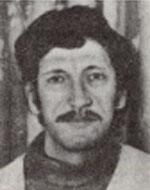Klarsfeld (Bar-Sadeh), Yitzhak
Isaac, son of Frida and Joseph, was born on January 1, 1938 in Romania and immigrated to Israel with his family in 1951. He began his studies in his hometown and later studied at Kibbutz Gvat. Yitzhak was very sociable, and on the kibbutz he was well absorbed and adapted without any difficulties to the special way of life. He soon became fond of all the members and was acceptable to them, studied and worked to the satisfaction of his teachers. He spent a few years on the kibbutz, but was forced to leave and join his parents in the moshav in order to help them carry the burden of farming their farm in Carmon, near Ashdod. In addition to the hard work in his parents’ farm, Yitzhak enlisted in public service and did much to improve the place. He planted most of the trees on the inner roads of the moshav and were proud of him. His friend told him: “Isaac loved agriculture with all his Lev and soul and was not deterred from any hard work, and he was immersed in it from dawn to the late hours of the evening, but it was not his only love: Yitzhak loved nature and was fascinated by the sight of a flower, Of every other creature of nature, he also had a musical ear and loved to listen to music for hours on end. ” Yitzhak was drafted into the IDF in early January 1956 and assigned to the Engineering Corps, where he completed a professional training course and was assigned to the IAF unit, a good soldier, responsible and dedicated to his position. After he was discharged from the regular army, he was assigned to a reserve unit and was trained in a paramedics course, and was awarded the “Six Day War.” When the Yom Kippur War broke out, Yitzhak was sent to the front in Sinai and was annexed to the Armored Corps. The war experienced heavy battles and bravely wounded many wounded under heavy fire. A few hours before he fell, he was saved from death, in a mortal manner, a friend who was injured. “On the 19th of Tishrei 5734 (19.10.1973), at the airport of Dever-Soir, west of the canal, he was hit by the shelling of the enemy. – The cemetery in the village of Warburg left behind a wife and two daughters, a brother and two sisters, and was promoted to the rank of corporal, and the Beer Tuvia Regional Council published a booklet called “Ella Habanim” in memory of the people who fell in the war.
